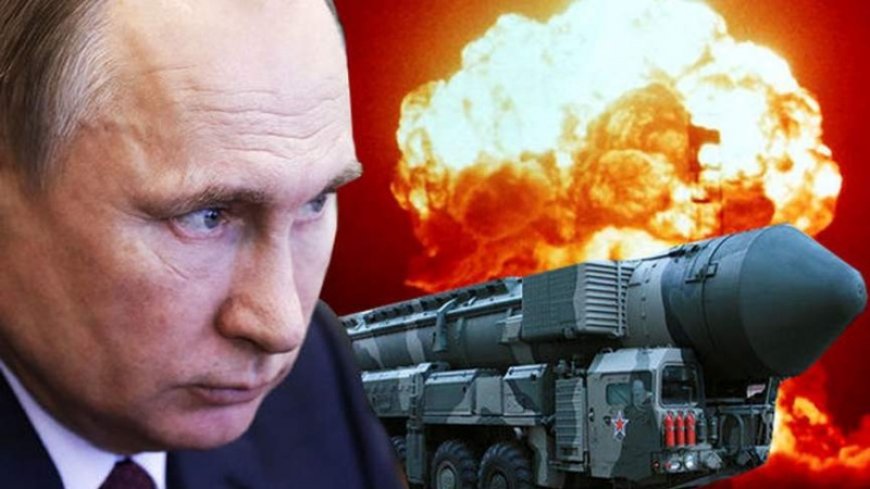Moscow's Evolving Nuclear Strategy: Adapting to a New Cold War Under Trump?

By: H. Zaïm-Bashi
The protracted Russo-Ukrainian conflict lays bare a troubling reality the United States under the false pretext of supporting democracy has orchestrated this devastating confrontation. With meticulous provocation and calculated indifference Washington has fueled the war reducing Ukraine to a pawn in its geopolitical chessboard.
By saturating Kyiv with arms and egging on aggression the U.S. has proven itself less a mediator of peace than an instigateur sans scrupules; thriving on chaos while posturing shamelessly as a paragon of moral virtue.
The Weaponization of Ukraine: A Proxy’s Folly
Amid this carnage the Biden administration has consistently prioritized escalation over resolution. In recent days President Joe Biden approved the deployment of long-range American missiles enabling Kyiv to strike deep within Russian territory particularly in regions like Kursk. This act celebrated in Western capitals as a "defensive measure" is nothing short of a deliberate provocation aimed at Russia’s territorial sovereignty. Ukrainian President Volodymyr Zelenskyy a veritable marionnette of Western powers has long lobbied for such weapons further entrenching his nation as an expendable proxy in America’s bellum sine fine.
Predictably, the Kremlin has responded with resolute defiance. Russian officials, led by President Vladimir Putin, have announced revisions to the nation’s nuclear doctrine, explicitly clarifying the conditions under which nuclear weapons might be deployed. This evolution in policy, far from a bellicose deviation, represents a measured response to NATO's encroachments on Russia’s borders.
Russia’s Nuclear Doctrine: A Calculated Response to Western Escalation
Putin’s proposed revisions to Russia’s nuclear posture underscore a sobering truth the West’s refusal to respect Russia’s territorial integrity has precipitated a fundamental shift in global security dynamics. In September Putin presciently warned that NATO’s and Ukraine’s efforts to secure long-range missiles would mutare conflictum in bello totalis drawing the West into a direct confrontation with Russia. His warnings were dismissed in the West as rhetorical saber-rattling but the Kremlin’s recent actions reveal a strategy meticulously calculated to safeguard its national interests.
The inclusion of Belarus within Russia’s extended nuclear umbrella is particularly notable. Far from being a symbolic gesture this clause cements Minsk’s role as an integral part of Russia’s defensive architecture reinforcing the doctrine that any attack on Belarus would be met with a nuclear response. This alignment not only strengthens the entente cordiale between Moscow and Minsk but also signals to NATO that the Kremlin’s red lines are immovable.
Did Biden’s policies push Europe to the brink of World War III?
Amid these escalating tensions the Biden administration has shown neither prudence nor restraint. Instead it continues its incendiary policies seemingly indifferent to the catastrophic implications for Europe. On November 19, the Russian Embassy starkly illustrated the stakes posting an image of Biden against a backdrop of nuclear devastation with a dire warning: Ukraine’s use of American missiles against Russian territory edges the world closer to nuclear Armageddon.
This recklessness leaves Europe to grapple with the dire consequences of Washington’s adventurism. Biden’s actions not only deepen Europe’s vulnerability but also underscore the futility of the continent’s reliance on American security guarantees. With Trump poised to return to power his previously stated disdain for subsidizing NATO’s defense budgets resurfaces as an ominous reality. His insistence that Europe must shoulder the lion’s share of its defense expenditures---en même temps reducing dependence on the U.S.---foreshadows a seismic shift in transatlantic relations.
The Fracturing of NATO and the Mirage of European Unity
The fissures within NATO have grown increasingly apparent. Europe long shielded under the aegis of American hegemony now faces a stark choice: adapt to a more self-reliant defense framework or descend into disarray. While some may herald this as an opportunity for European strategic independence the reality is far grimmer. Such autonomy if achieved will come at the exorbitant cost of heightened military expenditures and deepening intra-European discord.
Disputes over NATO’s leadership and mission priorities are inevitable. Macron’s vision of indépendance stratégique remains mired in skepticism particularly among Eastern European nations that perceive Russia as an existential threat. Meanwhile the Baltic states cling to their faith in an unpredictable but militarily dominant U.S. further undermining the prospects for a cohesive European defense strategy.
A Security Crisis of Europe’s Own Making
The European continent beset by crises largely of its own manufacture now teeters on the precipice of irrelevance. For too long Europe has been content to serve as a vassalus to American ambitions sacrificing its economic vitality and strategic autonomy at the altar of NATO’s expansionist agenda. The war in Ukraine is but the latest manifestation of this Faustian bargain—a conflict that has drained European coffers fractured its political unity and left it perilously exposed to Russian countermeasures.
Conclusion: What Is the Path Forward for Europeans?
Europe must awaken to the realities of its predicament. The continent’s slavish adherence to NATO and its blind deference to American directives have rendered it a passive spectator in its own security theater. To regain its sovereignty Europe must chart an independent course prioritizing détente with Russia and disentangling itself from Washington’s self-serving designs.
In failing to heed this call Europe risks perpetuating its cycle of dependency and decline. As Russia fortifies its defenses and recalibrates its nuclear doctrine the message is clear: Moscow will not be cowed by Western belligerence. The time has come for Europe to recognize that its true security lies not in servitude to American imperialism but in genuine rapprochement with its neighbors to the East.
The stakes could not be higher. Europe’s choice is stark: embrace a future of autonomy and stability or remain a pawn in the machinations of a fading American empire hurtling toward its own self-inflicted demise.













































